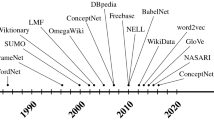
Overview
- Semantic domains boost the performance of natural-language processing systems
- Includes supplementary material: sn.pub/extras
Access this book
Tax calculation will be finalised at checkout
Other ways to access
About this book
Semantic fields are lexically coherent – the words they contain co-occur in texts. In this book the authors introduce and define semantic domains, a computational model for lexical semantics inspired by the theory of semantic fields. Semantic domains allow us to exploit domain features for texts, terms and concepts, and they can significantly boost the performance of natural-language processing systems. Semantic domains can be derived from existing lexical resources or can be acquired from corpora in an unsupervised manner. They also have the property of interlinguality, and they can be used to relate terms in different languages in multilingual application scenarios. The authors give a comprehensive explanation of the computational model, with detailed chapters on semantic domains, domain models, and applications of the technique in text categorization, word sense disambiguation, and cross-language text categorization. This book is suitable for researchers and graduate students in computational linguistics.
Similar content being viewed by others
Keywords
Table of contents (7 chapters)
Authors and Affiliations
Bibliographic Information
Book Title: Semantic Domains in Computational Linguistics
Authors: Alfio Gliozzo, Carlo Strapparava
DOI: https://doi.org/10.1007/978-3-540-68158-8
Publisher: Springer Berlin, Heidelberg
eBook Packages: Humanities, Social Sciences and Law, Social Sciences (R0)
Copyright Information: Springer-Verlag Berlin Heidelberg 2009
Hardcover ISBN: 978-3-540-68156-4Published: 13 August 2009
Softcover ISBN: 978-3-642-42586-8Published: 06 November 2014
eBook ISBN: 978-3-540-68158-8Published: 31 July 2009
Edition Number: 1
Number of Pages: IX, 131
Topics: Computational Linguistics, Natural Language Processing (NLP), Artificial Intelligence, Information Storage and Retrieval



